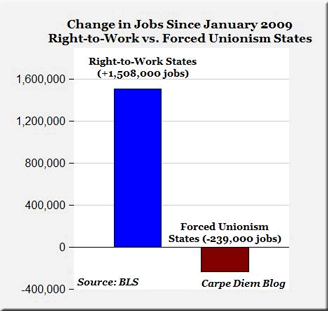Will Team Biden Weaponize Workers’ Pensions?
Big Labor abuse of worker pension and benefit funds as a means of advancing union bosses’ self-aggrandizing policy objectives is a familiar phenomenon.
 If Obama is really serious about job creation, he should support Sen. Paul’s National Right to Work Act. The American Enterprise Institute argues that the strongest thing President Obama could do to jump start the economy would be he help pass the National Right to Work law introduced by Sen. Rand Paul:
If Obama is really serious about job creation, he should support Sen. Paul’s National Right to Work Act. The American Enterprise Institute argues that the strongest thing President Obama could do to jump start the economy would be he help pass the National Right to Work law introduced by Sen. Rand Paul:
In the State of the Union address, President Obama made a case for measures and proposals that he says will boost job creation and put the economy on a more upward trajectory.” If he’s really serious about job creation, the president might want to consider supporting Senator Rand Paul’s “National Right to Work Act,” explained here on the National Institute for Labor Relations Research (NILRR) blog.
Sen Paul’s bill S. 204 would “restore an important personal freedom for millions of American employees,” by repealing “the current provisions in federal labor law that authorize compulsory union dues and fee payments as a condition of employment.” And what does that have to with boosting job creation? The NILRR.org explains:
Of all the economic reforms Congress may consider this year and in 2014, S.204 would surely have the strongest positive impact for incomes and jobs. The potential boost S.204 could give to the national employment market can be illustrated by the U.S. Department of Labor’s data for civilian employment in the 50 states from January 2009, the month Barack Obama took office as U.S. President, through December 2012. This is the most comprehensive Labor Department gauge of job growth available.
In the 22 states that had Right to Work (RTW) laws on the books protecting employees from forced union dues throughout the past four years, civilian employment has grown by a net 1.51 million, or 2.7%, since January 2009 (see chart above). Meanwhile, in the 27 states that lacked Right to Work laws prior to December 2012, civilian employment fell by nearly 240,000, or 0.3%.
All the eight states with the highest percentage job growth from January 2009 through December 2012 — Florida, Nebraska, North Carolina, North Dakota, Oklahoma, Tennessee, Texas and Virginia — are Right to Work. Meanwhile, seven of the nine states with the worst job losses are forced-unionism.
MP: The labor market data illustrated above suggest that RTW states are net job-creators while forced unionism states are net job-destroyers. By supporting national RTW legislation, President Obama would demonstrate that he’s really serious about helping the US economy to create more jobs and bring down the stubbornly high jobless rate. But realistically, the President will likely present government solutions, not market-based solutions, to job creation. The New York Times is already reporting that President Obama will “propose government action in education, manufacturing, infrastructure and clean energy,” and Sen. Marco Rubio is predicting that the president will ask us “to embrace the principles of more government, more government spending, more government control of our economy.” So we realistically shouldn’t expect any mention tonight of S. 204, which means that the president isn’t really serious about any proposals to increase jobs, no matter how successful, if those solutions alienate his union supporters.

Big Labor abuse of worker pension and benefit funds as a means of advancing union bosses’ self-aggrandizing policy objectives is a familiar phenomenon.

What impact does handing a union monopoly power to deal with your employer on matters concerning your pay, benefits, and work rules have on your pay?

Security guard James Reamsma is disappointed that the Right to Work repeal re-imposes forced-dues payments, but he and his coworkers still have a shot to restore their liberty.